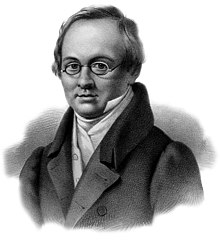Anton Delvig
Baron Anton Antonovich Delvig (Russian: Антон Антонович Дельвиг[note 1], tr. Antón Antónovich Délʹvig, IPA: [ɐnˈton ɐnˈtonəvʲɪtɕ ˈdelʲvʲɪk]; German: Anton Antonowitsch Freiherr[1] von Delwig; 17 August [O.S. 6 August] 1798, Moscow – 26 January [O.S. 14 January] 1831, St. Petersburg) was a Russian poet and journalist of Baltic German ethnicity.
Anton Antonovich Delvig | |
|---|---|
 | |
| Born | 17 August [O.S. 6 August] 1798 |
| Died | 26 January [O.S. 14 January] 1831 |
| Occupation | poet and journalist |
Life
Anton Delvig was of Baltic-German descent from paternal side. He studied in the Tsarskoye Selo Lyceum together with Alexander Pushkin and Wilhelm Küchelbecker with whom he became close friends. Küchelbecker dedicated a poem ('O, Delvig') to him; this poem was later set to music by Dmitri Shostakovich in the ninth movement of his fourteenth symphony. Delvig commissioned a portrait of Pushkin from Orest Kiprensky, which Pushkin bought from Delvig's widow after his friend's death.[2] In 1820, Delvig met Yevgeny Baratynsky and introduced him to the literary press.
In his poetry, Delvig upheld the waning traditions of Russian Neoclassicism. He became interested in Russian folklore and wrote numerous imitations of folk songs. Some of these were put to music by the composers Alexander Alyabyev and Mikhail Glinka.[3]
As a journalist, Delvig edited the periodical Northern Flowers (1825–1831), in which Pushkin was a regular contributor. In 1830–1831, he co-edited with Pushkin the Literaturnaya Gazeta, which was banned by the Tsarist government after information laid by Thaddeus Bulgarin.
Notes
- In Delvig's day, his name was written Антонъ Антоновичъ Дельвигъ.
References
- Regarding personal names: Freiherr is a former title (translated as Baron). In Germany since 1919, it forms part of family names. The feminine forms are Freifrau and Freiin.
- Антон Дельвиг Archived 2011-12-14 at the Wayback Machine // Автор: Н. В. Банников
- "Дельвиг А. А." Archived from the original on 2016-03-03. Retrieved 2016-01-22.
